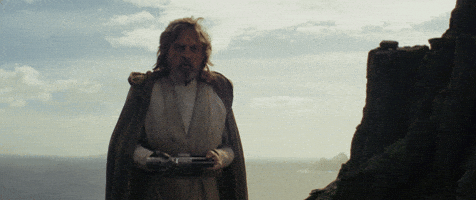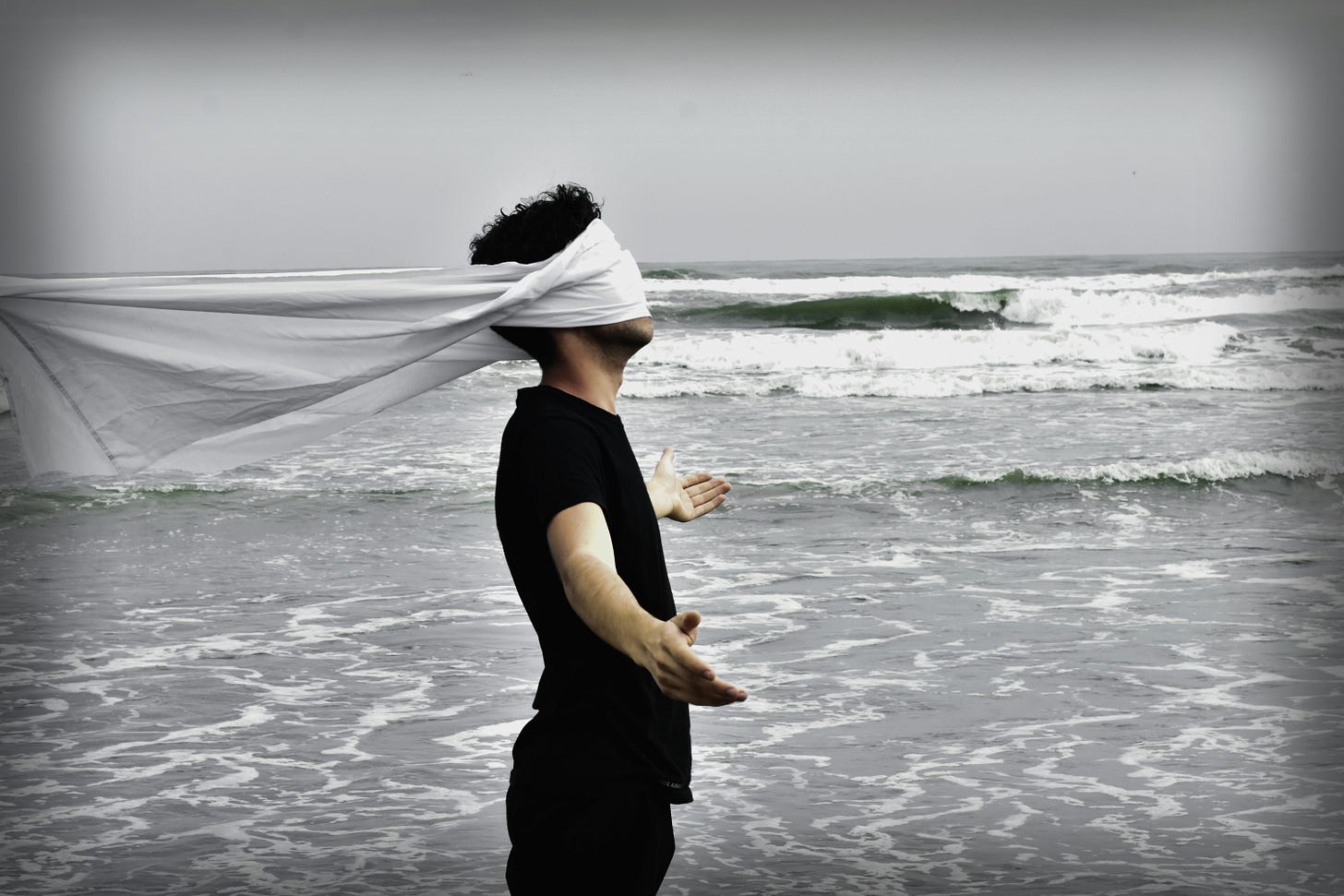“You think what? I’m gonna walk out with a laser sword and face down the whole First Order?”
Luke Skywalker, The Last Jedi
Nothing is more emblematic of a Jedi Knight than the lightsaber. In the original 1977 Star Wars, Obi Wan Kenobi displays a laser sword and informs Luke Skywalker, "this is the weapon of a Jedi Knight. Not as clumsy or random as a blaster; an elegant weapon for a more civilized age". What sci fi-loving kid from the 80's didn’t pick up a flashlight and pretend it was a lightsaber? But a lightsaber isn’t the essence of being a Jedi...at least, not ultimately. After the infamous release of the first Star Wars prequel in 1999, I remember a friend who confessed to having spent countless hours of his youth in the forest attempting to hone his force-sensitivity, only to be disappointed in discovering that your Midi-chlorian count is what determines your ability to use the force…what gives?!
If you consider 1983's Return of the Jedi, it's notable that Luke Skywalker's most definitive moment has nothing to do with his command of the force, or his dexterity at wielding a lightsaber. Though he uses the signature green blade in the first act of the film to save his friends on Tatooine, he defaults to a different kind of strength to save the galaxy. While the rebels amass on the Endor moon, Luke senses that his presence endangers their mission to destroy the second Death Star. In an act of submission that resembles the Prophet Isaiah's description of Christ (Isaiah 53:7), Luke surrenders himself to Imperial troops and literally turns in his weapon. Later on, at a crucial moment in the Emperor’s throne room, he discards his weapon and proclaims, ‘I am a jedi…like my father before me…’, after which the Emperor electrocutes him for failing to turn to the dark side. It is of course, this sacrificial act that redeems Darth Vader from the power of the Sith, as he beholds his son suffering in his place. It is in weakness and humiliation that Luke appeals to Anakin beneath the façade of his self righteous armor, and saves his soul. Furthermore, in tossing away his weapon, he repudiates what Robert Capon has referred to as, ‘right handed power’, which is direct, straight-line power that “uses the force you need to get the results you want”1.
The fact that some of the more recent Star Wars content emphasizes right handed power (i.e. Rogue One's obligatory Darth Vader cameos, The Mandalorian season 2 finale, or this ridiculous clip) reveals how grace always upends our expectations of what power has to look like. In first Century Palestine, few people expected the long awaited Messiah to ride in on a donkey, to be crowned with thorns, or to be humiliated in the shameful death of the cross. Their notion of Christ was informed less by Isaiah’s description of the Suffering Servant (Isaiah 53), than by Psalm 2's Prophecy of the Son of God who would vanquish all Israel's enemies. As I consider the classic Star Wars trilogy that profoundly shaped my childhood, I realize that what spoke to my heart ultimately wasn’t X -wings, lightsaber battles, the Millennium Falcon's light speed capacity, etc. Instead, it was the timeless themes of sacrifice, grace, power through weakness, etc. I just didn’t realize it at the time…or have the theological knowledge or vocabulary to articulate it.
We don’t really believe the theology of the cross ‘works’ in real life. At least, I don’t. I never think deference is going to work in the midst of my personal relationships. I always think getting my way is the answer. I often assume winning is the way (especially in marriage), instead of finding freedom in losing and being wrong, which I am most of the time anyway! I identify with the apostle Peter, who consistently got it wrong when it came to following Jesus. Whether we are talking about his rash statement at the Transfiguration, his attempt to keep Jesus from going to the cross, his refusal to let Jesus wash his feet…even down to his dying days, he never fully accepted that the way of suffering leads us to eternal life (cf. John 21:18, 19). In fact, Peter was convinced he could lay down life for Jesus, but he wasn’t convinced of the sufficiency of Christ, who would give His life for the world. And if you read Galatians, you see that he continued to miss the mark as it concerns grace. Then again, don’t we all?
I like Peter though - his story is relatable. And not just Peter…Paul too…and the Old Testament prophet, Elijah. In 1 Kings 19, we have this account of Elijah running from queen Jezebel who threatened his life after he slew the false prophets of baal, and restored Israel to true worship. After running from the Jezebel’s death notice, he eventually collapses in the wilderness and has to be revived by an angel, who strengthens him to travel to Mount Horeb. It is here where ‘the word of the LORD’ meets him and exposes the pride he couldn’t see in himself. After God prompts Elijah twice with the question, ‘what are you doing here?’, he confesses his hubris thusly,
“I have been very zealous for the Lord God Almighty. The Israelites have rejected your covenant, torn down your altars, and put your prophets to death with the sword. I am the only one left, and now they are trying to kill me too.”
Note the self centeredness in his insistence that he is the only one left who truly worships God, as opposed to all of Israel whom Elijah assumes had gone astray in idolatry. God corrects the prophet’s error, reminding him there remain yet “7,000 in Israel who have not bowed the knee to baal”. In writing to the Corinthian church, the apostle Paul cites a similar instance he and his ministry team encountered as they faced a trial so severe that they ‘despaired of life itself’ (2 Corinthians 1:8-9). Yet Paul clarifies that such affliction was necessary that they might not rely on themselves, but on “God who raises the dead”. In other words, without going through that trial, they could not have seen the self righteousness to which they remained blind, though they were effectively serving the Lord (more on this in another post)! Their pride was so deeply ingrained that it literally took suffering to finally see it. And even when they saw it, they couldn’t do anything about it. Neither can we…
When the trials of life show us the arrogance we can’t see in ourselves, we find ourselves helpless to course-correct. In that moment of humiliation, we are driven back to Christ, or rather He comes to us. My favorite illustration of what this looks like, comes from the 90's sitcom, Home Improvement, starring comedian Tim Allen as Tim ‘The Tool Man’ Taylor whose blunders as a home improvement ‘expert’ mirror his constant struggle to get it right in the home, as a dad and as a husband (I can relate). The show’s signature trademark occurred at the end of every episode, in which Tim would come to the end of himself and seek wisdom from his unconventional neighbor, Wilson, who for the most part would remained partially concealed behind the fence that separated their backyards. Ever the faithful neighbor, he would always allow Tim to open up, pour out his martial or parenting troubles, and confess his missteps, after which, Wilson would finally deliver sage advice that would provide relief.
In 2 Corinthians 3, Paul reminds us of a greater hope we have in Christ. Having contrasted the Old Testament account of Moses descending from Mount Sinai, against the freedom we have in Christ, the apostle draws a parallel between Moses whose face radiated with the shekinah glory of God, against a greater glory we find in the gospel of Jesus Christ. Referencing the book of Exodus, Paul informs us that Moses had to cover his face with a veil, because the people of Israel could not directly looking at his brilliance. According to Paul, this same veil remains whenever one hears the Scriptures, yet fails to see their fulfillment in Christ. It is “whenever anyone turns to the Lord” that the veil is taken away, and we are set free to behold the glory of God in the face of Jesus Christ. Such glory transforms us from ‘one degree of glory to another’ as we are conformed to the likeness of Christ, and receive His very righteousness. God is more than an eccentric neighbor hiding behind a fence, dispensing good advice when we have reached wits end. He is fully revealed in the One, whose very flesh was the veil torn open that we might receive grace now and for eternity. The gospel that never changes, never stops changing us, and always in subtle ways that we don’t even recognize. And thank God we don’t, because if we could, we would be even more puffed up than we already are!
From Capon’s classic tome, Kingdom, Grace, and Judgment.






Good stuff, brother 🫶